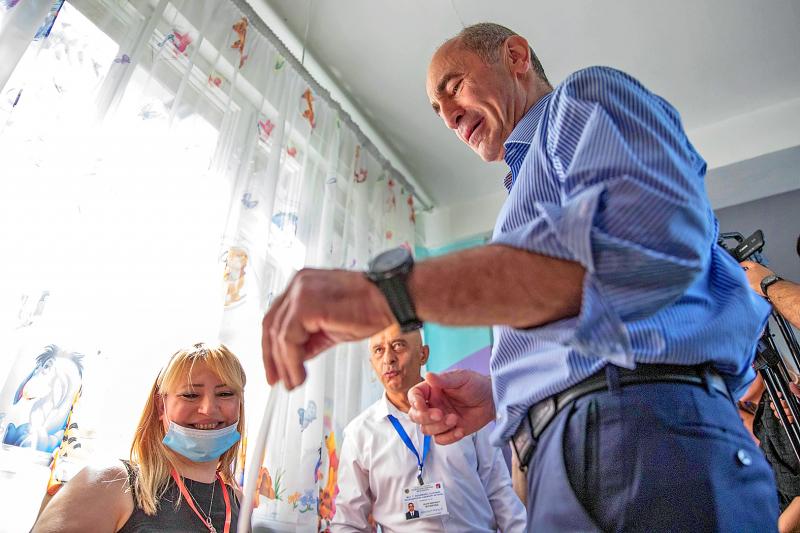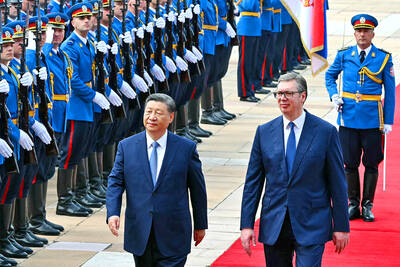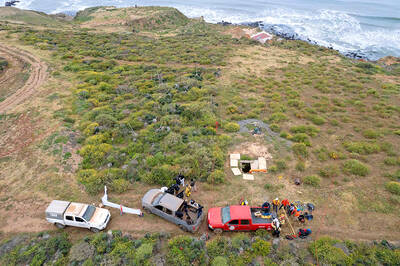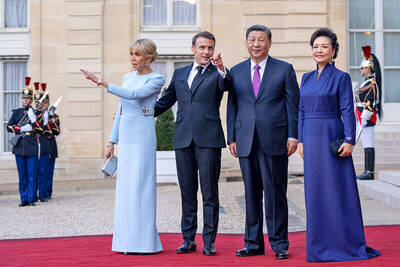Armenians went to the polls yesterday in early parliamentary elections which were called in an attempt to heal the country’s divisions after a disastrous war with Azerbaijan, but which could spark post-vote protests.
Armenian Prime Minister Nikol Pashinyan, who has lost much of his appeal after a military defeat last year to arch foe Azerbaijan, is hoping to renew his mandate, but is in a tight race with former Armenian president Robert Kocharyan.
During a campaign marred by polarizing rhetoric, Pashinyan said that he expected his Civil Contract party to secure 60 percent of the vote, even though some pollsters say that those estimates are far-fetched.

Photo: EPA-EFE
The election in the country of three million people is being watched by Armenia’s Soviet-era master Russia as well as Turkey, which backed Azerbaijan in last year’s six-week war over the breakaway region of Nagorno-Karabakh.
As soon as voting started, people began trickling into polling stations in central Yerevan.
One voter, Anahit Sargsyan, told reporters that Pashinyan deserved another chance, adding that she feared the return of the old guard, whom she accused of plundering the country.
“I voted against a return to the old ways,” the 63-year-old former teacher said.
Another voter, Vardan Hovhannisyan, said that he cast his ballot for Kocharyan, who counts Russian President Vladimir Putin among his friends.
“I voted for secure borders, solidarity in society, the return of our war prisoners, the well-being of the wounded and a strong army,” the 41-year-old musician said. “Only Kocharyan can deliver that.”
Critics accuse Pashinyan of ceding swathes of territory in and around Nagorno-Karabakh to Azerbaijan in a truce agreement that ended the fighting and of failing to deliver reforms.
Pashinyan says that he had to agree to the Moscow-brokered truce with Azerbaijan to prevent further human and territorial losses.
More than 6,500 people were killed in the war, according to the latest official estimates from Armenia and Azerbaijan.
Analysts say that the election result is hard to predict, with both Pashinyan and Kocharyan drawing massive crowds in the final days of the race.
Besides Kocharyan, who hails from Nagorno-Karabakh and was in power between 1998 and 2008, two other leaders of post-Soviet Armenia are backing parties in the race. All three are in opposition to Pashinyan.
A venomous campaign saw candidates exchange insults and threats, and both frontrunners are expected to stage demonstrations after the election.
Pashinyan, 46, brandished a hammer at rallies, while Kocharyan, 66, said that he would be ready to fight the prime minister in a duel and claimed that he was planning to rig the vote.
Armenian President Armen Sarkisian, largely a ceremonial figure, decried attempts “to incite hatred and enmity,” and urged law enforcement to prevent any violations.
“These elections are taking place in a difficult situation,” he said on Saturday. “They are of crucial importance for our state and people.”
Kocharyan, who is seen as a wealthy man, faces a corruption probe and was also investigated over a deadly crackdown on protesters more than a decade ago.
Some observers say that Pashinyan might be investigated over his handling of the Nagorno-Karabakh war if he is voted out of power.
A poll released Friday by MPG, a group affiliated with Gallup International Association, showed Kocharyan’s Armenia bloc leading narrowly with 28.7 percent to 25.2 percent for Pashinyan’s party. Following in third with 10.8 percent was an alliance linked to Pashinyan’s enemy and predecessor, Serzh Sargsyan.
A record four electoral blocs and 21 parties are running in the election, but only a handful are expected to win seats in parliament.
About 2.6 million people are eligible to vote to elect for a five-year term the minimum number of 101 lawmakers under a proportional electoral system.
A winning party needs to obtain at least 50 percent of legislative seats plus one and can be assigned additional seats to form a government.
Polls will close at 8pm in an election being monitored by observers from the Organization for Security and Co-operation in Europe.

MONEY MATTERS: Xi was to highlight projects such as a new high-speed railway between Belgrade and Budapest, as Serbia is entirely open to Chinese trade and investment Serbian President Aleksandar Vucic yesterday said that “Taiwan is China” as he made a speech welcoming Chinese President Xi Jinping (習近平) to Belgrade, state broadcaster Radio Television of Serbia (RTS) said. “We have a clear and simple position regarding Chinese territorial integrity,” he told a crowd outside the government offices while Xi applauded him. “Yes, Taiwan is China.” Xi landed in Belgrade on Tuesday night on the second leg of his European tour, and was greeted by Vucic and most government ministers. Xi had just completed a two-day trip to France, where he held talks with French President Emmanuel Macron as the

With the midday sun blazing, an experimental orange and white F-16 fighter jet launched with a familiar roar that is a hallmark of US airpower, but the aerial combat that followed was unlike any other: This F-16 was controlled by artificial intelligence (AI), not a human pilot, and riding in the front seat was US Secretary of the Air Force Frank Kendall. AI marks one of the biggest advances in military aviation since the introduction of stealth in the early 1990s, and the US Air Force has aggressively leaned in. Even though the technology is not fully developed, the service is planning

INTERNATIONAL PROBE: Australian and US authorities were helping coordinate the investigation of the case, which follows the 2015 murder of Australian surfers in Mexico Three bodies were found in Mexico’s Baja California state, the FBI said on Friday, days after two Australians and an American went missing during a surfing trip in an area hit by cartel violence. Authorities used a pulley system to hoist what appeared to be lifeless bodies covered in mud from a shaft on a cliff high above the Pacific. “We confirm there were three individuals found deceased in Santo Tomas, Baja California,” a statement from the FBI’s office in San Diego, California, said without providing the identities of the victims. Australian brothers Jake and Callum Robinson and their American friend Jack Carter

CUSTOMS DUTIES: France’s cognac industry was closely watching the talks, fearing that an anti-dumping investigation opened by China is retaliation for trade tensions French President Emmanuel Macron yesterday hosted Chinese President Xi Jinping (習近平) at one of his beloved childhood haunts in the Pyrenees, seeking to press a message to Beijing not to support Russia’s war against Ukraine and to accept fairer trade. The first day of Xi’s state visit to France, his first to Europe since 2019, saw respectful, but sometimes robust exchanges between the two men during a succession of talks on Monday. Macron, joined initially by EU Commission President Ursula von der Leyen, urged Xi not to allow the export of any technology that could be used by Russia in its invasion